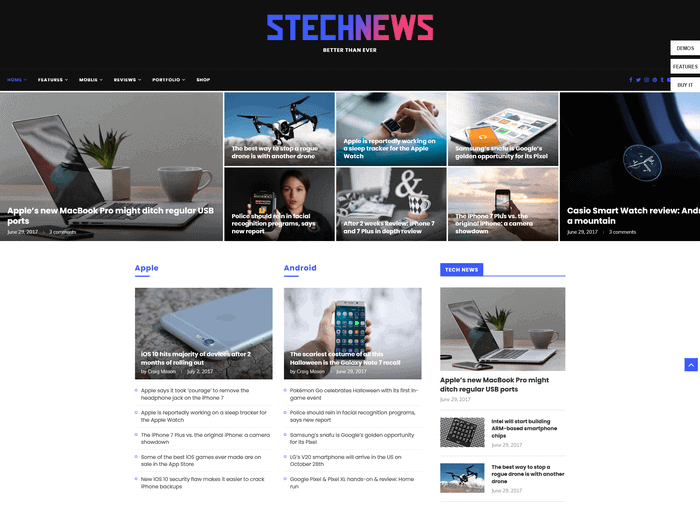Improve Your Understanding with the Best tech blog Featuring Industry Experts
Improve Your Understanding with the Best tech blog Featuring Industry Experts
Blog Article
Just How Blockchain Technology Is Revolutionizing Information Protection
Blockchain modern technology is basically changing the landscape of data security by presenting a decentralized structure that assures improved openness and resilience. Unlike standard systems, which rely on central data repositories, blockchain distributes data throughout a network, reducing vulnerabilities and single factors of failing. Making use of sophisticated cryptographic methods ensures that information continues to be tamper-proof, cultivating trust fund amongst stakeholders and users. As sectors rapidly adjust to this technology, concerns arise about its wider impact and prospective difficulties. What implications does this shift hold for future data security approaches and regulatory frameworks? The responses may surprise you (Best tech blog).
The Essentials of Blockchain
Blockchain technology, a cutting edge concept in electronic data management, fundamentally transforms just how info is saved and secured. At its core, a blockchain is a distributed ledger that tape-records purchases across a network of computers, ensuring openness and immutability. The technology operates a chain of blocks, each containing a listing of transactions. Once a block is filled up, it is time-stamped and connected to the previous block, developing a chronological chain.
Key to recognizing blockchain is the hashing process, which secures transaction data into a distinct alphanumeric code. This cryptographic feature makes sure that any kind of modification in the purchase data results in an entirely different hash, consequently guarding versus meddling. The consensus device, an additional important component, confirms and verifies brand-new deals with a network of nodes, consequently getting rid of the need for a central authority.
Furthermore, blockchain's append-only framework makes certain that information, once added, can not be erased or changed. This particular assurances a irreversible and verifiable record of purchases, fostering depend on among individuals. As a result, blockchain provides a robust structure for data honesty, supplying industries a reliable approach for monitoring and handling digital details in a secure, clear manner.
Decentralization and Security
Decentralization, a core principle of blockchain modern technology, considerably improves data protection by distributing control throughout a network rather than depending on a single, central entity. By dispersing data throughout many nodes, blockchain ensures that also if one node is endangered, the entire network stays safe and secure.

Moreover, decentralization equips individuals with better control over their information. Each participant in the network has accessibility to the entire blockchain, allowing them to confirm and investigate purchases individually. This transparency promotes trust among individuals, as they do not have to count on a central authority to ensure information stability. In general, decentralization contributes in enhancing information protection in blockchain networks.

Cryptographic Methods
At the heart of blockchain modern technology, cryptographic methods play a pivotal function in securing data, ensuring both confidentiality and stability. Cryptography in blockchain utilizes a combination of crooked and symmetrical formulas to encrypt information, making it obtainable only to licensed celebrations.
Hash features are another important component, changing input data into a fixed-size string of characters, effectively creating an one-of-a-kind electronic fingerprint for each and every block. This guarantees that any attempt click this link to modify the data will certainly cause a totally various hash, therefore maintaining the immutability of the blockchain. Digital signatures confirm the authenticity and integrity of deals, providing a layer of non-repudiation.
The decentralized nature of blockchain, incorporated with robust cryptographic strategies, gets rid of the demand for intermediaries, minimizing prospective susceptabilities. As blockchain modern technology advances, improvements in cryptography such as zero-knowledge proofs and homomorphic security remain to improve safety and security procedures, better strengthening information protection in this advanced digital ledger system.
Usage Cases Throughout Industries

In the medical care market, blockchain guarantees the safe storage space and sharing of person records, advertising interoperability while guarding delicate information from unauthorized access. This technology equips individuals with control over their medical history and facilitates seamless control among health care suppliers.
Supply chain management benefits dramatically from blockchain's unalterable ledger, which makes certain traceability and authenticity of products from origin to consumer. By boosting transparency, blockchain helps reduce issues such as counterfeiting and dishonest sourcing.
In addition, blockchain's decentralized why not check here nature is improving the energy industry by making it possible for peer-to-peer power trading, where consumers can acquire and market excess renewable power straight. This fosters an extra efficient and sustainable energy ecological community.
In the realm of intellectual building, blockchain supplies a tamper-proof platform for makers to sign up and shield their works, making certain rightful acknowledgment and reasonable settlement. These varied usage instances underscore blockchain's duty as a crucial pressure in redefining data safety and security across markets.
Future of Information Protection
As we aim to the future of data defense, blockchain modern technology is positioned to play a crucial function in protecting electronic details. With its decentralized and immutable features, blockchain offers a durable structure for securing delicate data against unauthorized access and cyber threats. This technology makes certain that when information is videotaped, it is nearly impossible to modify without detection, therefore offering a considerable benefit over typical data storage methods.
The assimilation of blockchain with other sophisticated innovations, such as synthetic intelligence and the Net of Points (IoT), is expected to enhance data security approaches better. By leveraging smart agreements, organizations can automate and impose security methods, lowering human error and enhancing effectiveness. Additionally, blockchain's ability to supply deducible and transparent transactions will certainly bolster trust fund and accountability in information monitoring methods.
As regulative landscapes evolve, blockchain's compliance-friendly nature will become progressively appropriate. It can aid organizations meet stringent information security regulations, such as the General Data Security Policy (GDPR) and the California Consumer Personal Privacy Act (CCPA), by supplying verifiable documents of data handling tasks. Inevitably, blockchain's special characteristics setting it as a transformative device in the ongoing quest to secure the digital globe against ever-evolving cyber risks.
Final Thought
Blockchain technology represents a standard change in data safety and security by leveraging decentralization and cryptographic strategies to boost openness, depend on, and information honesty. As cyber threats progress, blockchain arises as a vital device for robust information defense throughout different markets.
Blockchain technology is basically changing the landscape of data safety and security by presenting a decentralized framework that promises improved openness and resilience. Unlike typical systems, which count on centralized information databases, blockchain disperses information throughout a network, minimizing vulnerabilities and single factors of failing.Decentralization, a core principle of blockchain modern technology, dramatically improves data safety by dispersing control throughout a network rather than counting on a single, central entity.At the heart of blockchain technology, cryptographic methods play an essential duty in guarding data, guaranteeing both confidentiality and integrity.Blockchain modern technology stands for a standard shift in data safety by leveraging decentralization and cryptographic techniques to boost transparency, count on, and information stability.
Report this page